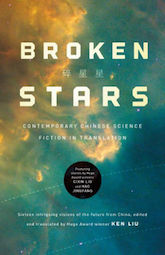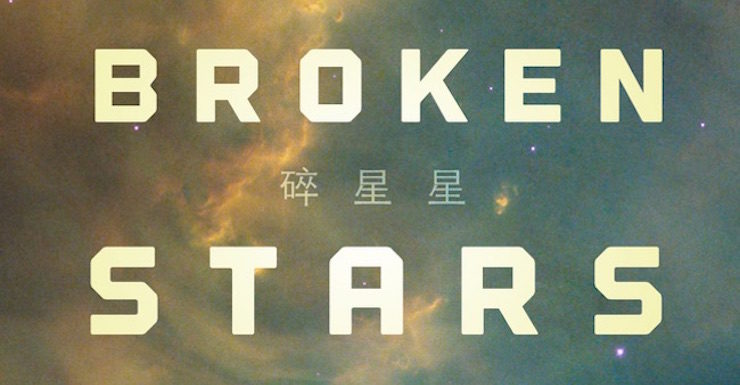In 2016, I read Invisible Planets—a book that served, for English speakers and/or cultural philistines such as myself, as an introduction to contemporary Chinese speculative fiction. “China has a vibrant, diverse science fiction culture,” writes editor, author, and translator Ken Liu in that book’s introduction, “but few stories are translated into English, making it hard for non-Chinese readers to appreciate them.”
Once they were translated, though, many of Invisible Planets’ stories were easy to appreciate: Showcasing work from writers like Xia Jia and Liu Cixin, Invisible Planets opened up a whole new aspect of science fiction for me and plenty of other English-readers. I didn’t stop there: I raced through Liu Cixin’s “Remembrance of Earth’s Past” trilogy, and then Ball Lightning; I kept an eye out for the translated Chinese stories featured each month in the forward-looking genre magazine Clarkesworld; I tried, with meager success, to track down more work from Xia Jia. (I won’t have to wait much longer.)
Now, three years later, comes Liu’s newest anthology of contemporary Chinese science fiction: Broken Stars, which offers 16 more translated stories. It’s a collection that’s just as surprising, exciting, and engrossing as the first.
“The most important criterion I used was simply this: I enjoyed the story and thought it memorable,” Liu writes in Broken Stars’ introduction, explaining his selection process. “When wielded honestly, very few stories pass this filter.” Luckily, Liu is almost supernaturally great at sharing stories that are, if nothing else, memorable—and, in most cases, that are also clever and strange, lyrical and addictive. Broken Stars kicks off with stories from two authors whose work shone particularly brightly in Invisible Planets: Xia Jia’s “Goodnight, Melancholy” offers an affecting, keenly imagined look at digital solitude and the legacy of Alan Turing, while Liu Cixin’s time-bending, brain-twisting “Moonlight” does exactly as Ken Liu promises it will: It offers “idea after idea in a dizzying fusillade.”
From there, Broken Stars takes a significantly broader look at Chinese science fiction than its predecessor did, with over a dozen authors represented. Not every story will click with every reader, but a few standouts will captivate all but the crankiest of readers: Boashu’s surreal love story “What Has Passed Shall in Kinder Light Appear” spans decades—decades in which the historical events that we know happen in decidedly different order, altering everything from technology to marriages to world wars. Boashu’s story is easily the longest selection in Broken Stars, and almost certainly the one that most relies on the reader’s knowledge of Chinese history, but it grows more engaging with each line. Another lengthy selection, Zhang Ran’s “The Snow of Jinyang,” also plays with time, albeit with a decidedly lighter heart: This one examines how a single city deals with disruptive inventions like the automobile and the internet… with the twist being that “The Snow of Jinyang” takes place in the 10th century CE. (Okay, so we’ve established that I don’t know a ton about Chinese history, but still, I’m pretty sure those weren’t around during the Five Dynasties and Ten Kingdoms period.)
Buy the Book


Broken Stars
There are others that lodge in one’s memory: Regina Kanyu Wang’s “The Brain Box” straddles the discomfiting line between Black Mirror and The Twilight Zone, with the added bonus that, unlike an episode of Black Mirror, you won’t feel lethally miserable after finishing it. Anna Wu’s “The Restaurant at the End of the Universe” starts as a Douglas Adams riff, then spins in a sadder, more intimate direction. And Chen Quifan’s viciously hilarious “A History of Future Illnesses” identifies every single fear you have about modern technology, then gleefully takes those fears to their logical conclusions—ensuring that, among other things, you’ll never look at your iPad the same way again. (Chen’s stories in Broken Stars also serve as an intriguing teaser: Next month, his 2013 novel The Waste Tide will finally see an English publication—translated, naturally, by Liu.)
There’s plenty more in these pages, but—like the stories above—they’re best experienced on their own terms, interrupted only by the occasional editor’s footnote that chimes in with historical or cultural context. Those footnotes can be lifesavers, at least for a newcomer like me: As was the case with Invisible Planets, Broken Stars seems geared to those English-readers who have only recently glimpsed all that Chinese science fiction can offer. And—also like its predecessor—Broken Stars has already made me want to read more work from its authors, and cross my fingers that Liu has another Chinese science fiction anthology in the works.
Broken Stars is available from Tor Books.
Read Ken Liu’s introduction to the anthology here.
A writer, editor, and male model, Erik Henriksen lives in Portland, Oregon. He’s written for the Portland Mercury, The Stranger, io9.com, Wired.com, and Tor.com. (Hey! That’s this site!) Learn all you ever wanted to know and more at henriksenactual.com.










